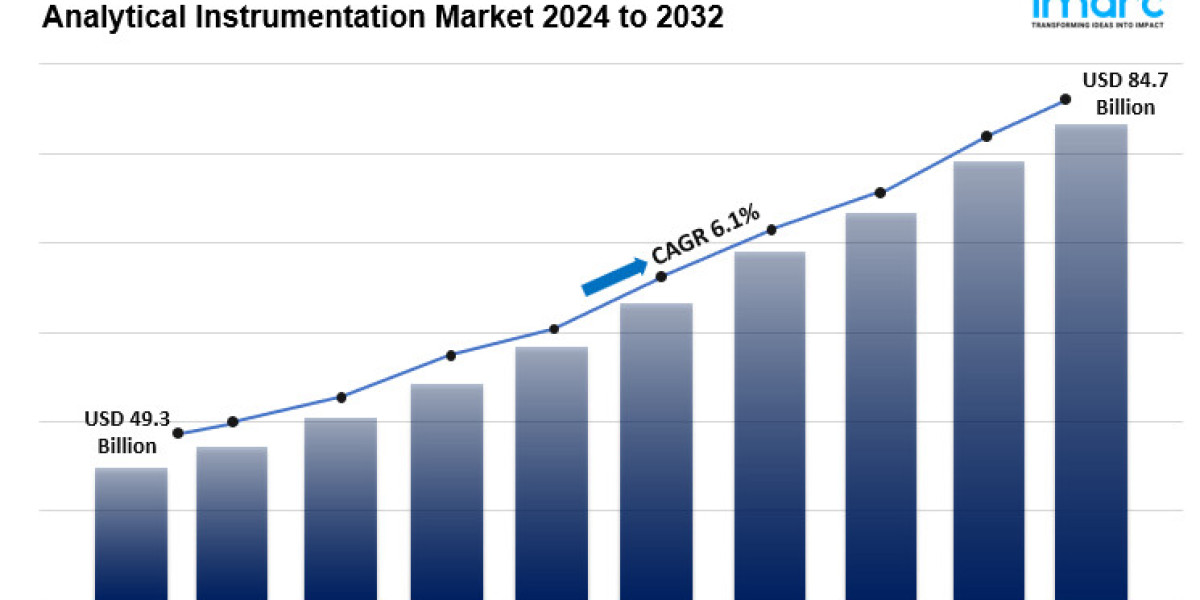IMARC Group's report titled "Analytical Instrumentation Market Report by Product Type (Chromatography, Molecular Analysis Spectroscopy, Elemental Analysis Spectroscopy, Mass Spectroscopy, Analytical Microscopes, and Others), End User (Life Sciences, Chemical and Petrochemical, Material Sciences, Food Testing, Oil and Gas, Water and Wastewater, and Others), and Region 2024-2032". The global analytical instrumentation market size reached USD 49.3 Billion in 2023. Looking forward, IMARC Group expects the market to reach USD 84.7 Billion by 2032, exhibiting a growth rate (CAGR) of 6.1% during 2024-2032.
Factors Affecting the Growth of the Analytical Instrumentation Industry:
- Increasing Research and Development (R&D) Activities:
The increase in research and development (R&D) initiatives across multiple sectors, particularly in pharmaceuticals, biotechnology, and materials science, is driving market expansion. In addition, organizations are making substantial investments in the creation of new products and technologies, which has resulted in a greater demand for analytical instruments capable of delivering precise, dependable, and comprehensive analyses of intricate samples. These instruments are essential for elucidating the composition, structure, and properties of materials at both molecular and atomic levels, thereby enabling significant advancements in research. Furthermore, the competitive dynamics within industries such as pharmaceuticals and biotechnology compel companies to pursue continuous innovation, serving as an additional catalyst for growth. Additionally, the rising focus on innovation and the proliferation of research facilities worldwide, including laboratories and academic institutions, further bolster market development.
- Regulatory Compliance and Quality Assurance:
Regulatory compliance and quality assurance are essential elements influencing the demand for analytical instrumentation across various sectors. The enforcement of strict regulations concerning product quality, safety, and environmental impact requires thorough testing and ongoing monitoring, thereby promoting market expansion. Analytical devices such as chromatographs, spectrometers, and mass spectrometers are vital in confirming that products adhere to rigorous quality standards, from the inspection of raw materials to the release of final products. Furthermore, these instruments are extensively employed in the food and beverage industry to assess contaminants, nutritional content, and compliance with safety regulations, thereby safeguarding consumer health and ensuring adherence to international food safety standards. Additionally, the increasing emphasis on sustainable practices, which has amplified the significance of environmental monitoring, is further contributing to market growth.
- Technological Advancements:
The recent emergence of miniaturized devices, which provide advantages such as portability and the necessity for smaller sample volumes, positions them as optimal solutions for field analyses and point-of-care diagnostics, thereby driving market expansion. In addition, the incorporation of automation and software has optimized workflows, minimized human error, and enabled intricate data analysis, which enhances productivity and allows for more advanced analyses, further bolstering market growth. Moreover, the introduction of high-throughput analytical instruments, which facilitate the swift screening of numerous samples, is also playing a significant role in market advancement. Furthermore, recent innovations in methodologies such as mass spectrometry, chromatography, and next-generation sequencing (NGS) have broadened the analytical capabilities of instruments, enabling the examination of complex biological samples, the detection of low-abundance molecules, and the exploration of intricate biochemical pathways, thus propelling market growth.
Leading Companies Operating in the Global Analytical Instrumentation Industry:
- Agilent Technologies Inc.
- Bio-Rad Laboratories Inc.
- Bruker Corporation
- Mettler Toledo
- PerkinElmer Inc.
- Shimadzu Corporation
- Spectris plc
- Thermo Fisher Scientific Inc.
- Waters Corporation.

For an in-depth analysis, you can refer sample copy of the report: https://www.imarcgroup.com/analytical-instrumentation-market/requestsample
Analytical Instrumentation Market Report Segmentation:
By Product Type:
- Chromatography
- Molecular Analysis Spectroscopy
- Elemental Analysis Spectroscopy
- Mass Spectroscopy
- Analytical Microscopes
- Others
Chromatography holds the largest market share due to its widespread application in pharmaceuticals, environmental testing, and food safety for separating complex mixtures into individual components with high precision.

By End User:
- Life Sciences
- Chemical and Petrochemical
- Material Sciences
- Food Testing
- Oil and Gas
- Water and Wastewater
- Others
Life sciences represented the largest market share because of the significant investments in pharmaceutical and biotechnological research, development of new drugs and therapies, and the increasing use of analytical instruments in genomics and proteomics.
Market Breakup by Region:
- North America (United States, Canada)
- Asia Pacific (China, Japan, India, South Korea, Australia, Indonesia, Others)
- Europe (Germany, France, United Kingdom, Italy, Spain, Russia, Others)
- Latin America (Brazil, Mexico, Others)
- Middle East and Africa
Global Analytical Instrumentation Market Trends:
The extensive use of analytical instruments within the life sciences industry for the purpose of decoding genetic data, comprehending protein functionalities, and creating targeted therapies is driving market expansion. Moreover, the growing emphasis on the safety and quality of food products, which has led to the implementation of more stringent food testing regulations, serves as an additional catalyst for growth. In addition, the increasing adoption of products in the realm of nanotechnology for the analysis of materials at the nano-scale, aimed at the development and quality assurance of nanomaterials and nano-based products, is further enhancing market growth. Lastly, the swift globalization of pharmaceutical manufacturing and supply chains, which has heightened the demand for standardized quality control practices across various regions, is contributing positively to market growth.
Note: If you need specific information that is not currently within the scope of the report, we will provide it to you as a part of the customization.
About Us:
IMARC Group is a global management consulting firm that helps the world’s most ambitious changemakers to create a lasting impact. The company provide a comprehensive suite of market entry and expansion services. IMARC offerings include thorough market assessment, feasibility studies, company incorporation assistance, factory setup support, regulatory approvals and licensing navigation, branding, marketing and sales strategies, competitive landscape and benchmarking analyses, pricing and cost research, and procurement research.















